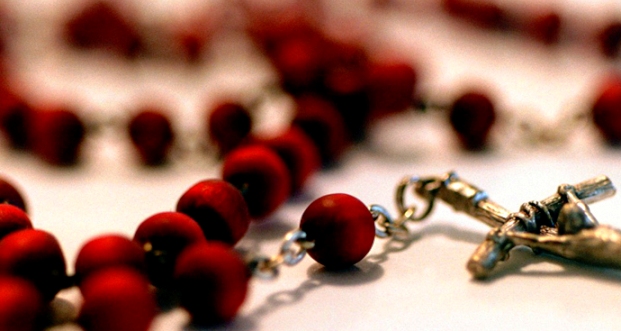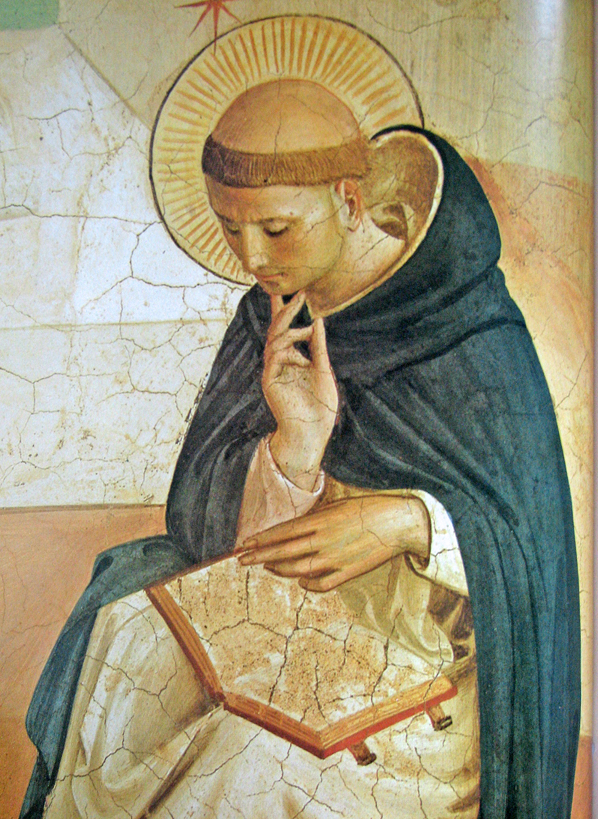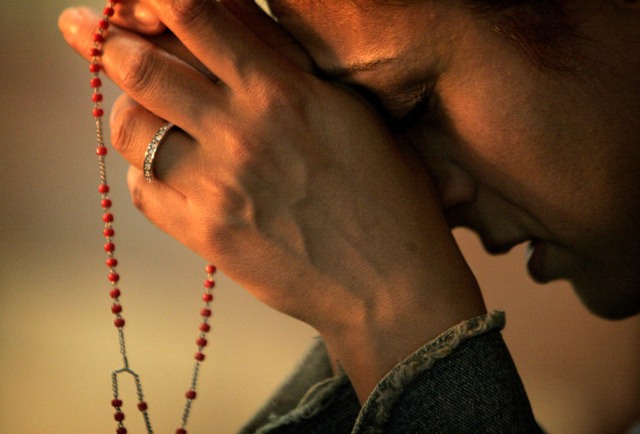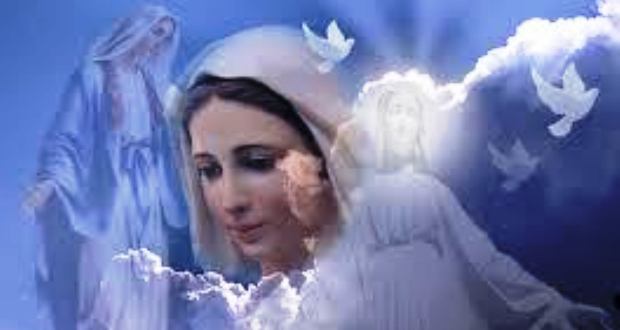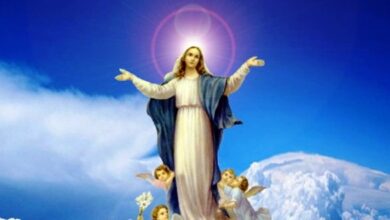The Secret Of The Rosary – Second Decade – Part 1
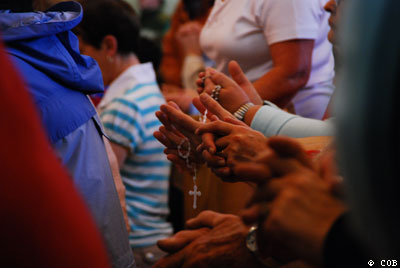

(St. Louis Marie de Montfort)
{play}images/stories/audio/The secret of the Rosary – decade 2-1.mp3{/play}
Eleventh Rose
The Creed or the Symbol of the Apostles, which is said on the crucifix of the rosary, is a holy summary of all the Christian truths. It is a prayer that has great merit, because faith is the root, foundation and beginning of all Christian virtues, of all eternal virtues, and of all prayers that are pleasing to God. “Anyone who comes to God must believe” (Heb. 11:6), and the greater his faith the more merit his prayer will have, the more powerful it will be, and the more it will glorify God.
I shall not take time here to explain the Creed word for word, but I cannot resist saying that the first words, “I believe in God,” are wonderfully effective as a means of sanctifying our souls and putting the devils to rout, because these words contain the acts of the three theological virtues of faith, hope and charity.
It was by saying these words that many saints overcame temptations, especially those against faith, hope or charity, either during their lifetime or at the hour of their death. They were also the last words of St. Peter, Martyr. A heretic had cleft his head in two by a blow of his sword, and although St. Peter was at his last gasp, he managed to trace these words in the sand with his finger.
The holy Rosary contains many mysteries of Jesus and Mary, and since faith is the only key which opens up these mysteries for us, we must begin the Rosary by saying the Creed very devoutly, and the stronger our faith the more merit our Rosary will have.
This faith must be lively and informed by charity; in other words, to recite the Rosary properly it is necessary to be in God’s grace, or at least seeking it. This faith must be strong and constant, that is, one must not be looking for sensible devotion and spiritual consolation in the recitation of the Rosary; nor should one give it up because the mind is flooded with countless involuntary distractions, or because one experiences a strange distaste in the soul or an almost continual and oppressive fatigue of the body. Neither feelings, nor consolation, nor sighs, nor transports, nor the continual attention of the imagination are needed; faith and good intentions are quite enough. “Sola fides sufficit” (Hymn “Pange lingua”).
Twelfth Rose
The Our Father or the Lord’s Prayer derives its great value above all from its author, who is neither a man nor an angel, but the King of angels and of men, our Lord Jesus Christ. St. Cyprian says it was necessary that he who came to give us the life of grace as our Saviour should teach us the way to pray as our heavenly Master.
The beautiful order, the tender forcefulness and the clarity of this divine prayer pay tribute to our divine Master’s wisdom. It is a short prayer but can teach us so very much, and it is well within the grasp of uneducated people, while scholars find it a continual source of investigation into the mysteries of God.
The Our Father contains all the duties we owe to God, the acts of all the virtues and the petitions for all our spiritual and corporal needs. Tertullian says that the Our Father is a summary of the New Testament. Thomas a Kempis says that it surpasses all the desires of all the saints; that it is a condensation of all the beautiful sayings of all the psalms and canticles; that in it we ask God for everything that we need, that by it we praise him in the very best way; that by it we lift up our souls from earth to heaven and unite them closely to God.
St. John Chrysostom says that we cannot be our Master’s disciples unless we pray as he did and in the way that he showed us. Moreover, God the Father listens more willingly to the prayer that we have learned from his Son rather than those of our own making, which have all our human limitations.
We should say the Our Father with the certitude that the eternal Father will hear us because it is the prayer of his Son, whom he always hears, and because we are his members. God will surely grant our petitions made through the Lord’s Prayer because it is impossible to imagine that such a good Father could refuse a request couched in the language of so worthy a Son, reinforced by his merits, and made at his behest.
St. Augustine assures us that whenever we say the Our Father devoutly our venial sins are forgiven. The just man falls seven times, and in the Lord’s Prayer he will find seven petitions which will both help him to avoid lapses and protect him from his spiritual enemies. Our Lord, knowing how weak and helpless we are, and how many difficulties we endure, made his prayer short and easy to say, so that if we say it devoutly and often, we can be sure that God will quickly come to our aid.
I have a word for you, devout souls who pay little attention to the prayer that the Son of God gave us himself and asked us all to say: It is high time for you to change your way of thinking. You only esteem prayers that men have written, as though anybody, even the most inspired man in the whole world, could possibly know more about how we ought to pray than Jesus Christ himself! You look for prayers in books written by other men almost as though you were ashamed of saying the prayer that our Lord told us to say.
You have managed to convince yourself that the prayers in those books are for scholars and for the rich, and that the Rosary is only for women and children and the poor people. As if the prayers and praises you have been reading were more beautiful and more pleasing to God than those which are to be found in the Lord’s Prayer! It is a very dangerous temptation to lose interest in the prayer that our Lord gave us and to take up prayers that men have written instead.
Not that I disapprove of prayers that saints have written to encourage the faithful to praise God, but it is not to be endured that they should prefer these to the prayer which was uttered by Wisdom incarnate. If they ignore this prayer, it is as though they passed by the spring to go to the brook, and refusing the clear water, they drink instead that which is dirty. For the Rosary, made up of the Lord’s Prayer and the Hail Mary, is this clear and ever-flowing water which comes from the fountain of grace, whereas other prayers which they look for in books are nothing but tiny streams which spring from this fountain.
People who say the Lord’s Prayer carefully, weighing every word and meditating on them, may indeed call themselves blessed, for they find therein everything that they need or can wish for.
When we say this wonderful prayer, we touch God’s heart at the very outset by calling him by that sweet name of Father.
“Our Father,” he is the dearest of fathers: all-powerful in his creation, wonderful in the way he maintains the world, completely lovable in his divine Providence, all good and infinitely so in the Redemption. We have God for our Father, so we are all brothers, and heaven is our homeland and our heritage. This should be more than enough to teach us to love God and our neighbour, and to be detached from the things of this world.
So we ought to love our heavenly Father and say to him over and over again: “Our Father who art in heaven” –
|
|
Thou who dost fill heaven and earth |
“Hallowed by thy name.” The name of the Lord is holy and to be feared, said the prophet-king David, and heaven, according to Isaiah, echoes with the praises of the seraphim who unceasingly praise the holiness of the Lord, God of hosts.
We ask here that all the world may learn to know and adore the attributes of our God, who is so great and so holy. We ask that he may be known, loved and adored by pagans, Turks, Jews, barbarians and all infidels; that all men may serve and glorify him by a living faith, a staunch hope, a burning charity, and by the renouncing of all erroneous beliefs. In short, we pray that all men may be holy because our God himself is holy.
“Thy kingdom come.” That is to say: May you reign in our souls by your grace, during life, so that after death we may be found worthy to reign with thee in thy kingdom, in perfect and unending bliss; that we firmly believe in this happiness to come; we hope for it and we expect it, because God the Father has promised it in his great goodness, and because it was purchased for us by the merits of God the Son; and it has been made known to us by the light of the Holy Spirit.
“Thy will be done on earth as it is in heaven.” As Tertullian says, this sentence does not mean in the least that we are afraid of people thwarting God’s designs, because nothing whatsoever can happen without divine Providence having foreseen it and having made it fit into his plans beforehand. No obstruction in the whole world can possibly prevent the will of God from being carried out.
Rather, when we say these words, we ask God to make us humbly resigned to all that he has seen fit to send us in this life. We also ask him to help us to do, in all things and at all times, his holy will, made known to us by the commandments, promptly, lovingly and faithfully, as the angels and the blessed do in heaven.
“Give us this day our daily bread.” Our Lord teaches us to ask God for everything that we need, whether in the spiritual or the temporal order. By asking for our daily bread, we humbly admit our own poverty and insufficiency, and pay tribute to our God, knowing that all temporal goods come from his Providence. When we say bread we ask for that which is necessary to live; and, of course that does not include luxuries.
We ask for this bread today, which means that we are concerned only for the present, leaving the morrow in the hands of Providence.
And when we ask for our daily bread, we recognize that we need God’s help every day and that we are entirely dependent upon him for his help and protection.
“Forgive us our trespasses as we forgive those who trespass against us.” Every sin, says St. Augustine and Tertullian, is a debt which we contract with God, and he in his justice requires payment down to the last farthing. Unfortunately we all have these sad debts.
No matter how many they may be, we should go to God with all confidence and with true sorrow for our sins, saying, “Our Father who art in heaven, forgive us our sins of thought and those of speech, forgive us our sins of commission and of omission which make us infinitely guilty in the eyes of thy justice.
We dare to ask this because thou art our loving and merciful Father, and because we have forgiven those who have offended us, out of obedience to you and out of charity.”
“Do not permit us,” in spite of our infidelity to thy graces, “to give in to the temptations” of the world, the devil, and the flesh.
“But deliver us from evil.” The evil of sin, from the evil of temporal punishment and of everlasting punishment, which we have rightly deserved.
“Amen.” This word at the end of the Our Father is very consoling, and St. Jerome says that it is a sort of seal of approbation that God puts at the end of our petitions to assure us that he will grant our requests, as though he himself were answering:
“Amen! May it be as you have asked, for truly you have obtained what you asked for.” That is what is meant by this word: Amen.
Thirteenth Rose
Each word of the Lord’s Prayer is a tribute we pay to the perfections of God. We honour his fecundity by the name of Father.
|
|
Father, |
“Our Father.” This means that he is the Father of mankind, because he has created us and continues to sustain us, and because he has redeemed us. He is also the merciful Father of sinners, the Father who is the friend of the just, and the glorious Father of the blessed in heaven.
When we say “Who art,” we honour by these words the infinity and immensity and fullness of God’s essence. God is rightly called “He who is” (Exod. 3:14); that is to say, he exists of necessity, essentially, and eternally, because he is the Being of beings and the cause of all beings. He possesses within himself, in a supereminent degree, the perfections of all beings, and he is in all of them by his essence, by his presence and by his power, but without being bounded by their limitations. We honour his sublimity and his glory and his majesty by the words “Who art in heaven,” that is to say, seated as on thy throne, holding sway over all men by thy justice.
When we say “Hallowed be thy Name,” we worship God’s holiness; and we make obeisance to his kingship and bow to the justice of his laws by the words “Thy kingdom come,” praying that men will obey him on earth as the angels do in heaven.
We show our trust in his Providence by asking for our daily bread, and we appeal to his mercy when we ask for the forgiveness of our sins.
We look to his great power when we beg him not to lead us into temptation, and we show our faith in his goodness by our hope that he will deliver us from evil.
The Son of God has always glorified his Father by his works, and he came into the world to teach men to give glory to him. He showed men how to praise him by this prayer, which he taught us with his own lips. It is our duty, therefore, to say it often, with attention, and in the same spirit as he composed it.
Fourteenth Rose
We make as many acts of the noblest Christian virtues as we pronounce words when we recite this divine prayer attentively.
In saying “Our Father, who art in heaven,” we make acts of faith, adoration and humility. When we ask that his name be hallowed, we show a burning zeal for his glory. When we ask for the spread of his kingdom, we make an act of hope; by the wish that his will be done on earth as it is in heaven, we show a spirit of perfect obedience. In asking for our daily bread, we practice poverty of spirit and detachment from worldly goods. When we beg him to forgive us our sins, we make an act of sorrow for them. By forgiving those who have trespassed against us, we give proof of the virtue of mercy in its highest degree. Through asking God’s help in all our temptations, we make acts of humility, prudence and fortitude. As we wait for him to deliver us from evil, we exercise the virtue of patience.
Finally, while asking for all these things, not only for ourselves but also for our neighbour and for all members of the Church, we are carrying out our duty as true children of God, we are imitating him in his love which embraces all men and we are keeping the commandment of love of our neighbour.
If we mean in our hearts what we say with our lips, and if our intentions are not at variance with those expressed in the Lord’s Prayer, then, by reciting this prayer, we hate all sin and we observe all of God’s laws. For whenever we think that God is in heaven, that is to say, infinitely removed from us by the greatness of his majesty, we place ourselves in his presence filled with overwhelming reverence. Then the fear of the Lord will chase away all pride and we will bow down before God in utter nothingness.
When we pronounce the name “Father” and remember that we owe our existence to God, by means of our parents, and even the instruction we have received by means of our teachers, who take the place of God and are his living images, we cannot help paying them honour and respect, or, to be more exact, to honour God in them. And nothing would be farther from our thoughts than to be disrespectful to them or hurt them.
When we pray that God’s holy name be glorified, we cannot be farther from profaning it. If we really look upon the kingdom of God as our heritage, we cannot possibly be attached to the things of this world.
If we sincerely ask God that our neighbour may have the same blessings that we ourselves stand in need of, it goes without saying that we will give up all hatred, quarrelling and jealousy. And if we ask God for our daily bread, we shall learn to hate gluttony and sensual pleasures which thrive in rich surroundings.
While sincerely asking God to forgive us as we forgive those who trespass against us, we no longer give way to anger and revenge, we return good for evil and we love our enemies.
To ask God to save us from falling into sin when we are tempted is to give proof that we are fighting laziness and that we are genuinely seeking means to root out vicious habits and to work out our salvation.
To pray God to deliver us from evil is to fear his justice, and this will give us true happiness, for the fear of God is the beginning of wisdom. It is through the virtue of the fear of God that men avoid sin.
Fifteenth Rose
The Angelic Salutation, or Hail Mary, is so heavenly and so beyond us in its depth of meaning, that Blessed Alan de la Roche held that no mere creature could ever understand it, and that only our Lord Jesus Christ, born of the Virgin Mary, can really explain it.
Its enormous value is due, first of all, to our Lady to whom it was addressed, to the purpose of the Incarnation of the Word, for which reason this prayer was brought from heaven, and also to the archangel Gabriel who was the first ever to say it.
The Angelic Salutation is a most concise summary of all that Catholic theology teaches about the Blessed Virgin. It is divided into two parts, that of praise and that of petition. The first shows all that goes to make up Mary’s greatness; and the second, all that we need to ask her for, and all that we may expect to receive through her goodness.
The most Blessed Trinity revealed the first part of it to us; St. Elizabeth, inspired by the Holy Spirit, added the second; and the Church gave us the conclusion in the year 430 when she condemned the Nestorian heresy at the Council of Ephesus and defined that the Blessed Virgin is truly the Mother of God. At this time she ordered us to pray to our Lady under this glorious title by saying, “Holy Mary, Mother of God, pray for us sinners, now and at the hour of our death.”
The greatest event in the whole history of the world was the Incarnation of the eternal Word by whom the world was redeemed and peace was restored between God and men. Our Lady was chosen as his instrument for this tremendous event, and it was put into effect when she was greeted with the Angelic Salutation. The archangel Gabriel, one of the leading princes of the heavenly court, was chosen as ambassador to bear these glad tidings.
In the Angelic Salutation can be seen the faith and hope of the patriarchs, the prophets and the apostles. Furthermore, it gives to martyrs their unswerving constancy and strength, it is the wisdom of the doctors of the Church, the perseverance of the holy confessors and the life of all religious (Blessed Alan). It is the new hymn of the law of grace, the joy of angels and men, and the hymn which terrifies devils and puts them to shame.
By the Angelic Salutation God became man, a virgin became the Mother of God, the souls of the just were delivered from Limbo, the empty thrones in heaven have been filled, sin has been pardoned, grace been given to us, the sick been made well, the dead brought back to life, exiles brought home, the Blessed Trinity has been appeased, and men obtained eternal life.
Finally, the Angelic Salutation is the rainbow in the sky, a sign of the mercy and grace which God has given to the world (Blessed Alan).


